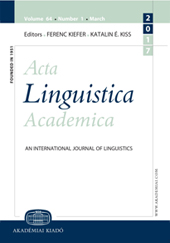The inspirational role of Chomsky in the cognitive turn of psychology
The inspirational role of Chomsky in the cognitive turn of psychology
Author(s): Csaba PléhSubject(s): Language studies, Psychology, Theoretical Linguistics
Published by: Akadémiai Kiadó
Keywords: Noam Chomsky; mentalism; theory theories; syntactic theories of mind; innatism; freedom and language
Summary/Abstract: The paper reviews the role of Noam Chomsky in the conceptual changes in modern psychology that are described by many as the cognitive revolution. Several aspects of the work of Chomsky are identified as key elements in the changes regarding the human mind, and the determinants of human nature. The mentalism of Chomsky resulted in the general spread of theory theories about human development, where the human mind is interpreted as a theory-using open, creative system. The peculiarities of sequential behavioral organization and later the sequential interface issues as well as the concentration on (syntactic) pure form were important inspirations for several general theories of human cognition. Chomsky, with his differentiation between competence and performance, opened the road along with David Marr to multilayered computational theories of the mind. While the innatist commitments of Chomsky regarding human development created many fruitful controversies during half a century, they also tied the underdetermined nature of human language with the philosophical issues of freedom. Language with its innate recursive system is a basic factor of human freedom. Freedom is connected to a rational image of humanity.
- Issue Year: 66/2019
- Issue No: 3
- Page Range: 397-428
- Page Count: 32
- Language: English
- Content File-PDF

